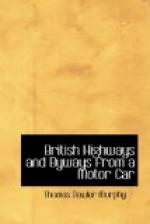From Gloucester to Ross runs an excellent highway, though rather devoid of interest. It was thronged with motorists who generally dashed along in sublime disregard of the speed limits. We passed several who were occupied with “roadside troubles” and we were in for an hour or so ourselves, due to a refractory “vibrator.” The Welsh farmers who passed joked us good-naturedly and one said he would stick to his horse until he had money to buy a motor—then, he added, he wouldn’t buy it, but would live on the income of the money. We told him that he was a man after Solomon’s own heart. Suddenly the evil spirit left the car and she sprang away over the beautiful road in mad haste that soon landed us in Ross.
Ross is a pretty village, situated on a green hillside overlooking the Wye, and the tall, graceful spire of its church dominates all views of the town. Although it was growing quite late, we did not stop here, but directed our way to Monmouth, twelve miles farther on, which we reached just as the long twilight was turning into night.
[Illustration: Distant view of Ross, south Welsh border.]
VIII
THROUGH BEAUTIFUL WALES
Of no part of our tour does a pleasanter memory linger than of the five or six hundred miles on the highways of Wales. The weather was glorious and no section of Britain surpassed the Welsh landscapes in beauty. A succession of green hills, in places impressive enough to be styled mountains, sloping away into wooded valleys, with here and there a quaint village, a ruined castle or abbey, or an imposing country mansion breaking on the view—all combined to make our journey through Wales one of our most pleasing experiences. Historic spots are not far apart, especially on the border, where for centuries these brave people fought English invaders—and with wonderful success, considering the greatly superior number of the aggressors. I have already written of Ludlow and Shrewsbury on the north, but scarcely less attractive—and quite as important in early days—are the fine old towns of Hereford and Monmouth on the southern border.
We were everywhere favorably impressed with the Welsh people as being thrifty and intelligent. The roadside drinking-houses were not so numerous as in England, for the Welsh are evidently more temperate in this regard than their neighbors. My observation in this particular is borne out by an English writer well qualified to judge. He says: “There is, of a truth, very little drinking now in rural Wales. The farming classes appear to be extremely sober. Even the village parliament, which in England discusses the nation’s affairs in the village public house, has no serious parallel in Wales, for the detached cottage-renting laborer, who is the mainstay of such gatherings, scarcely exists, and the farmer has other interests to keep him at home.” Evidently




